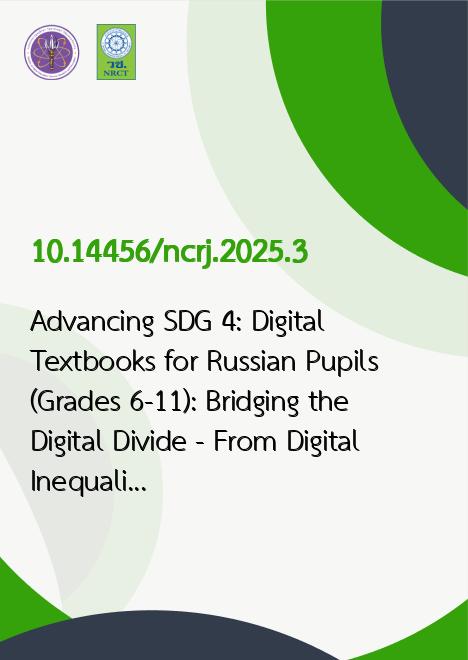
|
Advancing SDG 4: Digital Textbooks for Russian Pupils (Grades 6-11): Bridging the Digital Divide - From Digital Inequality to Digital Maturity |
|---|---|
| รหัสดีโอไอ | |
| Creator | Phillip Freiberg |
| Title | Advancing SDG 4: Digital Textbooks for Russian Pupils (Grades 6-11): Bridging the Digital Divide - From Digital Inequality to Digital Maturity |
| Publisher | National Institute of Development Administration |
| Publication Year | 2568 |
| Journal Title | NIDA Case Research Journal |
| Journal Vol. | 17 |
| Journal No. | 1 |
| Page no. | 62-104 |
| Keyword | Digital Textbooks, Digital Divide, Education Policy, Russia, Cost-Benefit Analysis |
| URL Website | https://so04.tci-thaijo.org/index.php/NCRJ |
| Website title | NIDA Case Research Journal |
| ISSN | 2822-0978 |
| Abstract | This paper investigates the potential of digital textbook readers to enhance education for studentsin grades 6-11 in Russian schools, aiming to bridge the digital divide and promote sustainabledevelopment. It explores how e-books can improve learning outcomes, their economicimplications for schools and families, and the policy framework necessary for their effectiveimplementation. The study utilizes a comprehensive review of recent literature, a cost-benefitanalysis to assess the impact of transitioning from traditional paper textbooks to e-books.Literature review suggests that while e-books can significantly enhance educational quality,reduce long-term costs, and minimize environmental impact, addressing infrastructure and policychallenges is crucial for their success. The paper comes up with a policy formulation in terms ofthe best gadget for electronic books. It provides recommendations for the Russian Ministry ofEducation, including a phased approach exploring alternative e-reader options due to Amazon'swithdrawal from the Russian market, and complementary strategies such as establishing digitallibraries and fostering partnerships. By addressing the digital divide and investing in digitalliteracy initiatives and strategic technology integration, Russia can create a more equitable,accessible, and effective education system that prepares students for the digital age. |